Unit 12 You’re supposed to shake hands.复习
文档属性
| 名称 | Unit 12 You’re supposed to shake hands.复习 |
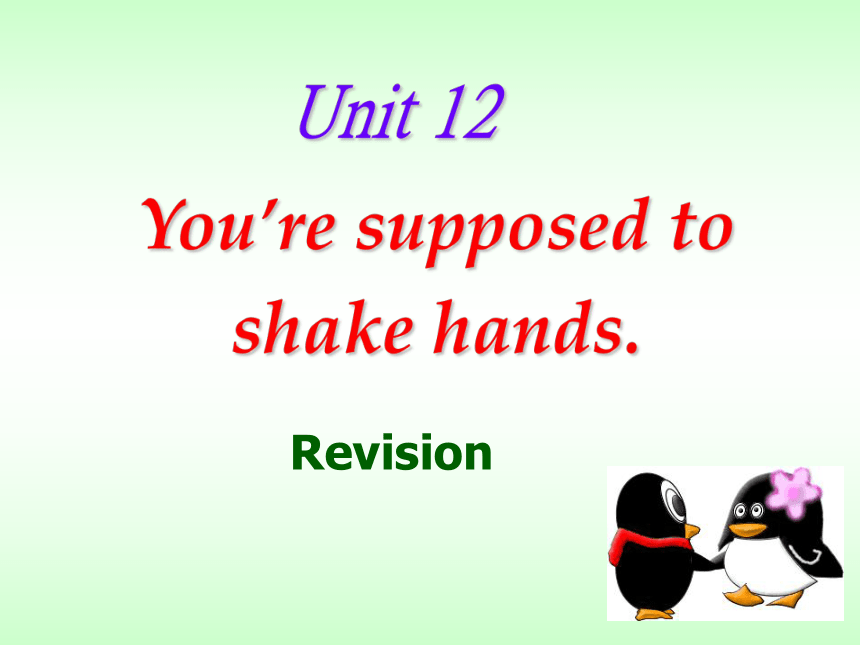
|
|
| 格式 | rar | ||
| 文件大小 | 2.2MB | ||
| 资源类型 | 教案 | ||
| 版本资源 | 人教新目标(Go for it)版 | ||
| 科目 | 英语 | ||
| 更新时间 | 2008-01-22 00:00:00 | ||
图片预览

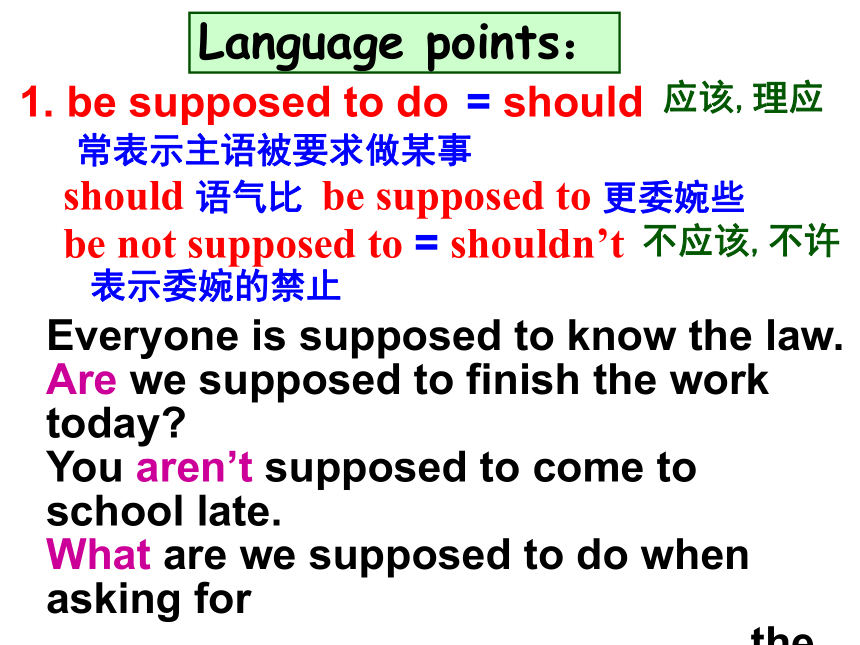
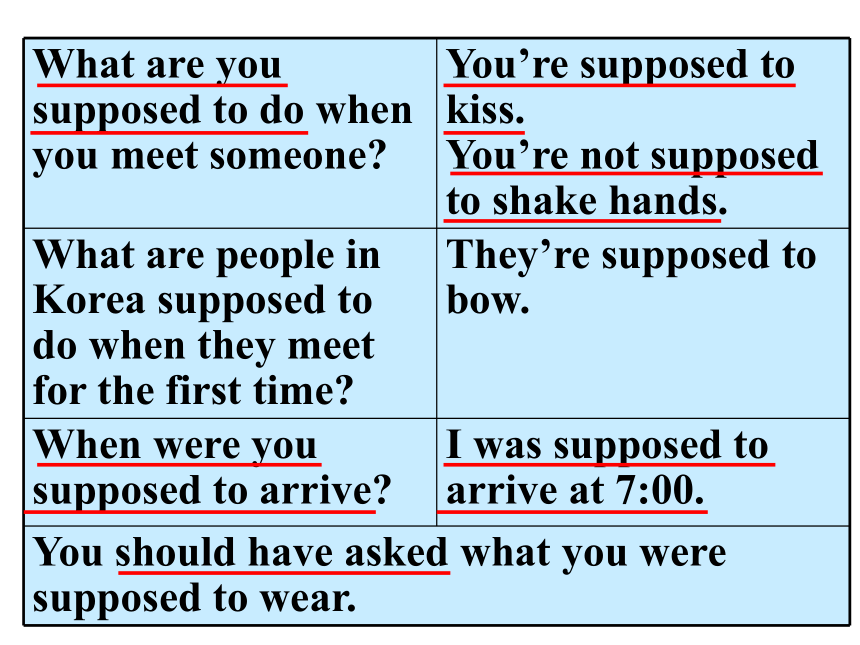
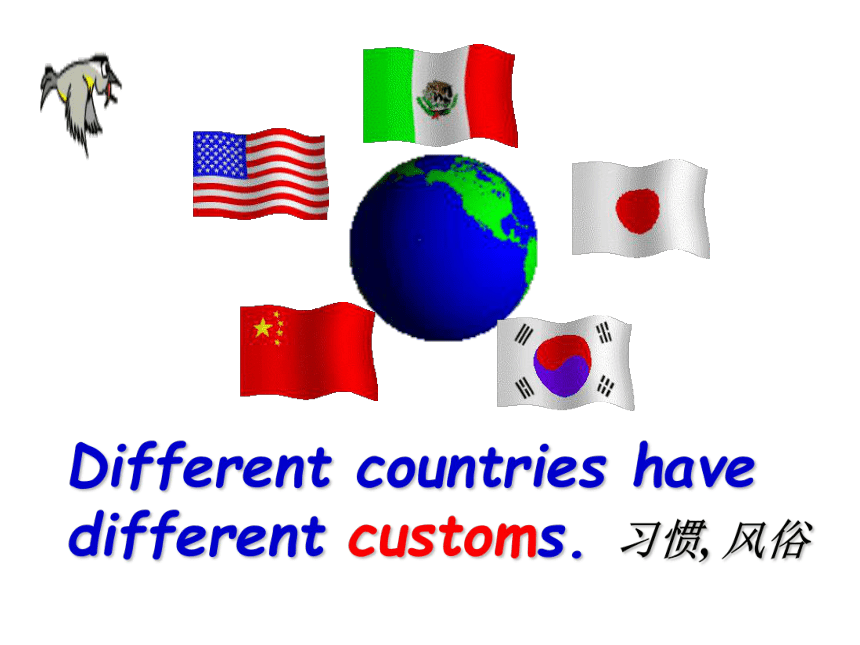
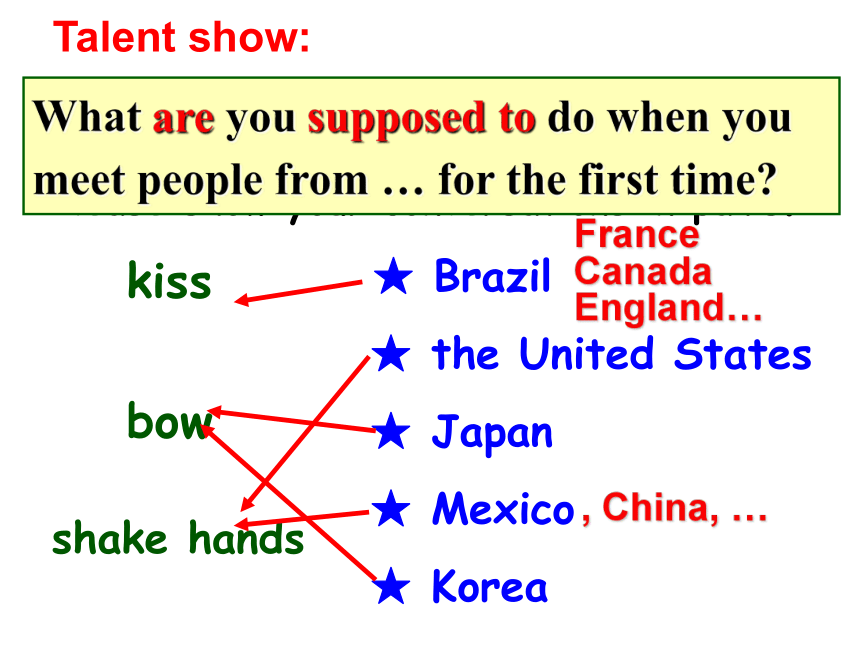
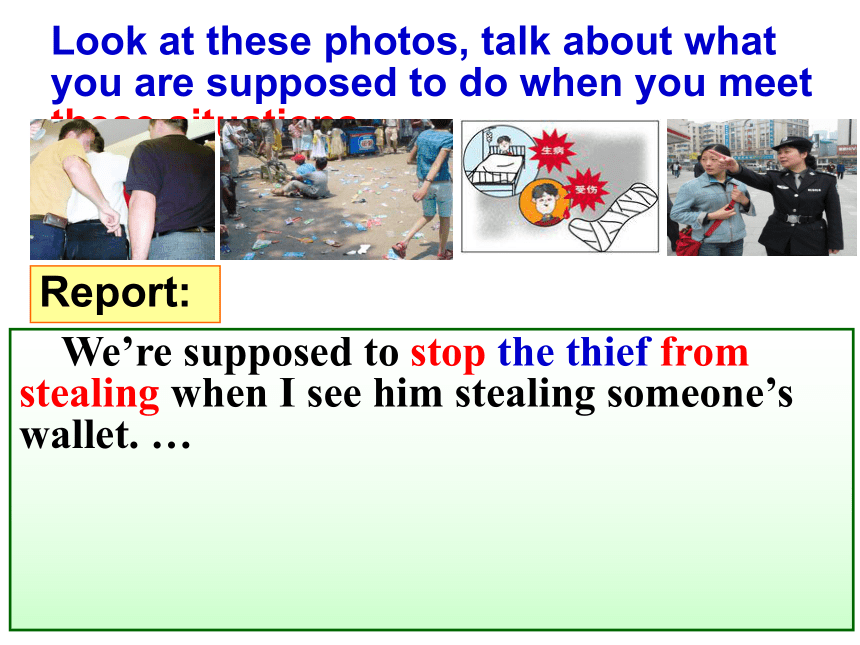
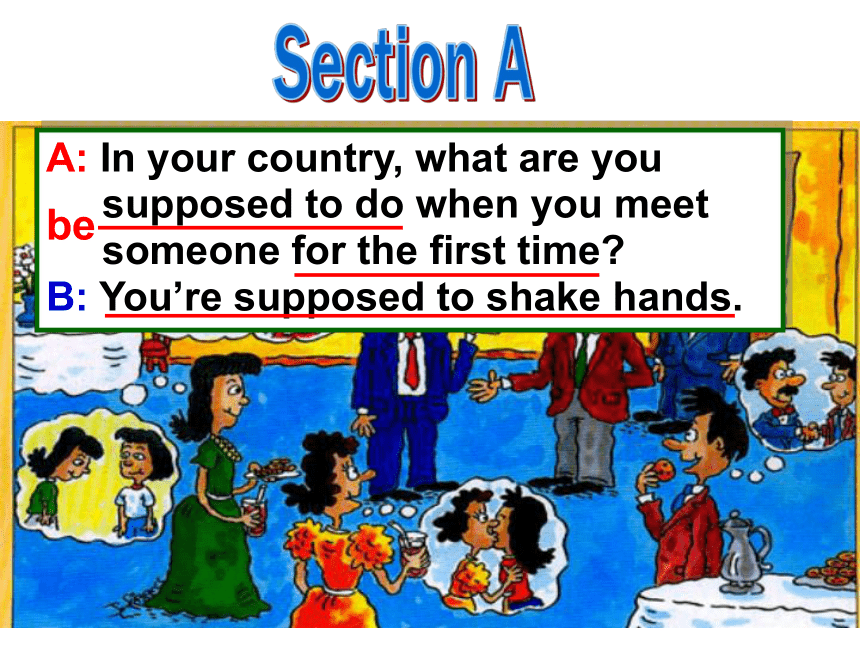
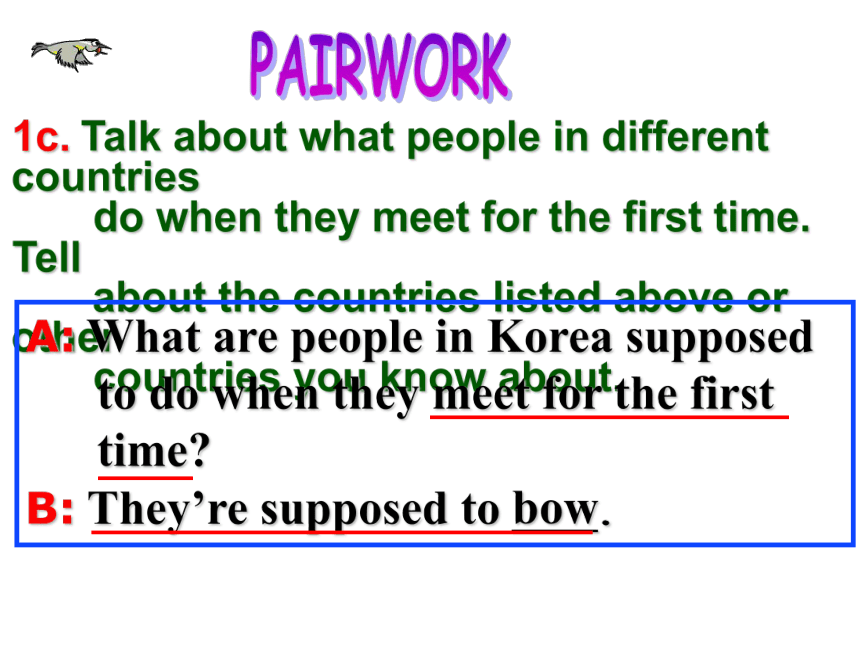
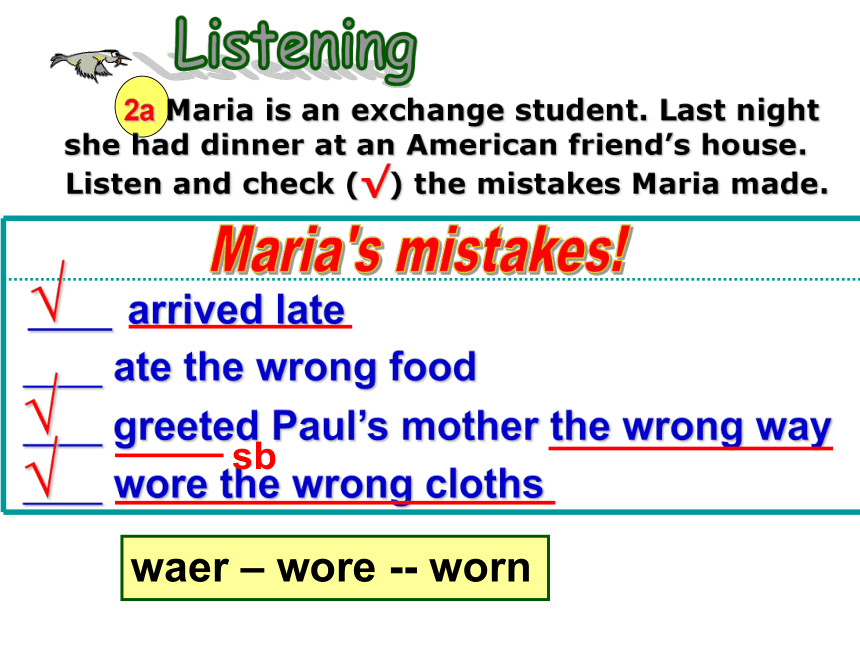
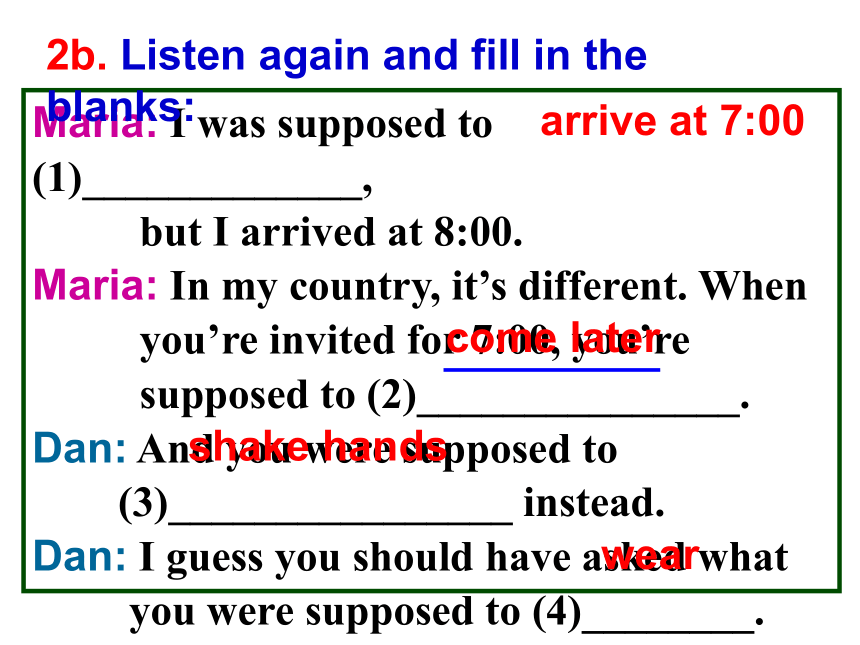
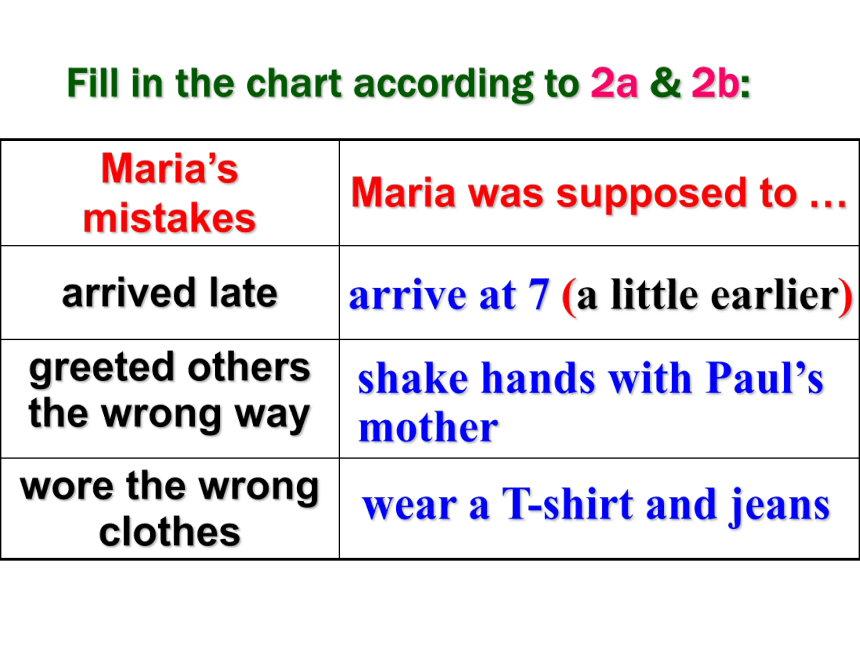
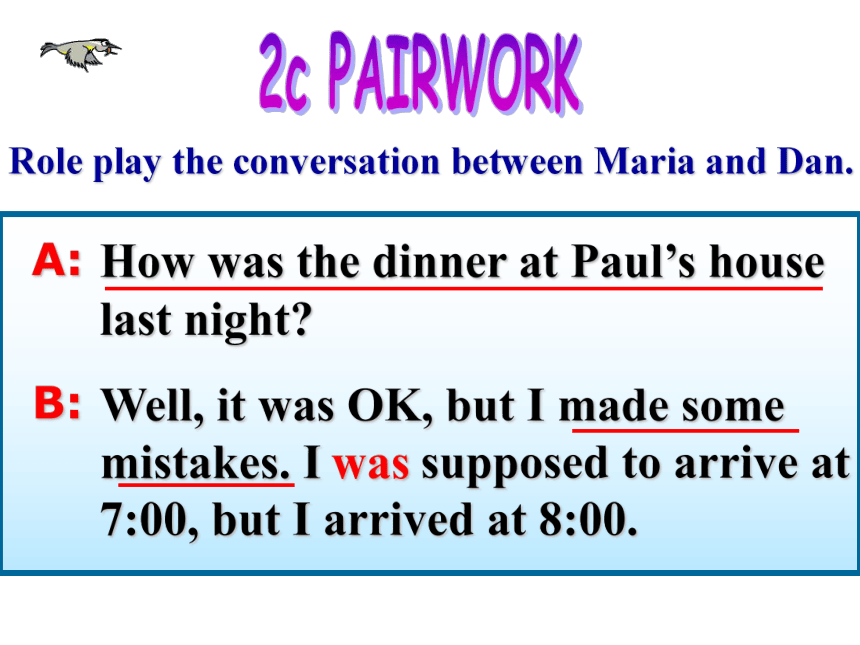
文档简介
课件86张PPT。You’re supposed to shake hands.Unit 12Revision1. be supposed to do应该,理应= should常表示主语被要求做某事should 语气比 be supposed to 更委婉些be not supposed to = shouldn’t不应该,不许表示委婉的禁止Everyone is supposed to know the law.
Are we supposed to finish the work today?
You aren’t supposed to come to school late.
What are we supposed to do when asking for
the way?
--When were you supposed to arrive?
--I was supposed to arrive at 7:00. Language points:Different countries have
different customs. 习惯, 风俗Talent show:
If you meet someone in the following countries, what are you supposed to do? Please show your conversations in pairs.
★ Brazil
★ the United States
★ Japan
★ Mexico
★ Korea kiss bow shake handsWhat are you supposed to do when you meet people from … for the first time?, China, …France Canada England…Look at these photos, talk about what you are supposed to do when you meet these situations. We’re supposed to stop the thief from stealing when I see him stealing someone’s wallet. …
Report:Section AA: In your country, what are you
supposed to do when you meet
someone for the first time?
B: You’re supposed to shake hands.1c. Talk about what people in different countries
do when they meet for the first time. Tell
about the countries listed above or other
countries you know about.PAIRWORKA: What are people in Korea supposed
to do when they meet for the first
time?
B: They’re supposed to bow. 2a Maria is an exchange student. Last night she had dinner at an American friend’s house. Listen and check (√) the mistakes Maria made.Listening Maria's mistakes!waer – wore -- wornMaria: I was supposed to (1)_____________,
but I arrived at 8:00.
Maria: In my country, it’s different. When
you’re invited for 7:00, you’re
supposed to (2)_______________.
Dan: And you were supposed to
(3)________________ instead.
Dan: I guess you should have asked what
you were supposed to (4)________.2b. Listen again and fill in the blanks:Fill in the chart according to 2a & 2b: arrive at 7 (a little earlier)shake hands with Paul’s mother wear a T-shirt and jeansRole play the conversation between Maria and Dan.2c PAIRWORK Where I’m from, we’re pretty relaxed about time. If you tell a friend you’re going to their house for dinner, it’s okay if you arrive a bit late. Spending time with family and friends is very important to us. We often just drop by our friends’ homes. We don’t usually have to make plans to meet our friends. Often we just walk around the town center, seeing as many of our friends as we can.3a. Read the following opinions of a Colombia
and a Swiss student and fill in the chart. In Switzerland, it’s very important to be on time. We’re the land of watches, after all! If someone invites you to meet them at 4:00, you have to be there at 4:00. If you’re even fifteen minutes late, your friend may get angry. Also, we never visit a friend’s house without calling first. We usually make plans to see friends. We usually plan to do something interesting, or go somewhere together.3a. Read the following opinions of a Colombia
and a Swiss student and fill in the chart.We are pretty relax about time.We often just drop by our friends’ homes.We don’t have to make
plans to meet friends.3a. Readinge.g. People in Colombia are pretty relaxed about
time…3a. ReadingIt’s very important to be on time.We never visit a friend’s house without calling first.We usually plan to do sth. interesting, or go some-where together.e.g. In Switzerland it’s very important to be on
time. …Role play the conversation between Teresa and Marc.A: What kinds of rules do they have in
Colombia?
B: Well, they have pretty relaxed rules.
A: Like what?
B: Well, it’s OK if you’re not on time.PAIRWORK3bIt’s OK …. 没关系, 没事
It’s okay if you arrive a bit late.PAIRWORK In China, what is supposed to do in these following situations?1. greeting teachers say, “Good morning.”2. doing homework 3. phoning someone 4. visiting someone’s
place call first, and knock
at the doorat home or in school
after class say, “Ni hao. I’m...”4Discuss the plan, call
to make changes.PAIRWORK In China, what is supposed to do in these following situations?5. making plans with
friends 6. being on time 7. giving gifts Always on time or
little earlierFestival gifts being
necessary.41. We are supposed to bow and say “Hello”
to the teachers when we meet them.
2. We are not supposed to kiss when we
meet the guests for the first time.
3. We are supposed to listen t o the
teachers carefully and take notes when
we are having lessons.
4. We are supposed to wear uniforms when
we go to school.
5. We’re supposed to behave politely.4. Brainstorms: Tell us what we are/ are not supposed to do at school?1. In the United States, you’re not
supposed to eat with your hands.
2. In Peru, you are not supposed to
talk at the table.
3. In China, you’re not supposed to
pick up your bowl of rice.
4. In Korea, the youngest person is
supposed to start eating first.
5. In Brazil, you should wipe your mouth with your napkin every time you take a drink.How much do you know about table manners around the world Mind your manners! 注意你的礼仪2b. Listen and match these sentence parts.3b Imagine you are Steve from 2b. Write an e-mail message to a friend about the table manners in Japan. Here are some things you need to know about table manners when you visit Japan. First of all, you should know how to use chopsticks. And you shouldn’t stick your chop-sticks into your food or point at anyone with your chopsticks. Also it’s rude to eat or drink while walking down the street. But it’s polite to make noise when eating noodles. It shows that you like the food. You’re not supposed to talk when eating dinner. Only parents are allowed to talk at the dinner table. 1. make noise while eating
2. stick your chopsticks into your food.
3. point at others with chopsticks
4. say hello to others
5. wipe your mouth after dinner
6. talk loudly at the table
7. kiss or shake hands
8. meet without saying anything
9. shake hands when you first meet someone
10. eat while walking in the streetIt’s polite…
It’s impolite…
It’s rude…Section B, 3aHere is an e-mail passage about an exchange student’s experience in a foreign country. Read it:Read again and answer the following questions:Because her French was not very good.Because her host family was really nice.
( They go out their way to make her feel at home.)She’s very comfortable speaking French
now. 5. What does she find surprising?Retell the E-mail according to the answers.One particular challenge is learning how
to behave at the dinner table.You put your bread on the table, not on
the plate.4. What is one particular challenge she is
facing?Tell your foreign friend table manners in China: The main difference on the Chinese dinner table is chopsticks instead of knife and fork. If you find the chopsticks not helpful enough, you can ask for a pair of knife and fork.
In China, the dishes are placed on the table and everyone shares. The meal usually begins with cold dishes before the main courses of hot meat and vegetable dishes. Then soup will be served. After that, Writing3c / P983c / P98the staple food such as rice, noodles or dumplings is served.
In formal dinners, there are always “public” chopsticks and spoons. The hosts like to put food into the plates of their guests. It is always polite to eat the food. If you do not eat it, just leave the food in the plate.
People in China tend to over-order food, for they will find it embarrassing if all the food is finished. When you have had enough, just say so, or you will overeat!GROUPWORKeating meals with other people
making appointments
giving compliments
introducing other people
making a toast at dinner
offering tea
speaking to older peopleHow can you help visitors to China? Make a list of things people are supposed to do in these different situations:4Eating meals with other people
Making appointments
Giving compliments4Let the other people order the dishes. Try to pay the bill yourself.Keep your appointments with others. To cancel an appointment, call or send a message one day or two days before the date.Give a sincere compliment always. Show modesty when given compliment.Introducing other people
Making a toast at dinner
Offering tea
Speaking to older people4Introduce the young to the old. Stand while being introduced.Make a toast to your guests first. Drink up the wine when being toasted.Offer others tea with a clean cup. Add more tea when the cup is emptied.Always speak to the old politely and loudly when necessary.1. People in Japan and America _______
differently at the dinner table.
2. You can _________ how different the
table manners here are from ours.
3. In singapore, the trains always _______
on time. Thay are never late.
4. On Chinese New Year, people like to
_______ time with their families.
5. I usually ________ my friends in the
library on Friday nights.1. Fill in the each blank with the correct word given.arrive meet spend behave imagine Read about Fan Ling’s experience in a western restaurant. Think about how you would solve her problem and finish Fan Ling’s story: When I first ate in a western restaurant, I didn’t know what I was supposed to do. Everything was unfamiliar. I was used to eating with chopsticks and a spoon, but I had to eat with a knife, a fork and a spoon. And I had not just one set to use, but two or three of each. Questions crowded my mind. Was I supposed to begin with the largest ones or the smallest? Was I supposed to start at the outside and work in or the inside and work out? Was I supposed to hold the spoon in my left hand or my right hand? What I finally decided to do was …2.2.What I finally decided to do was to look up at how the others behave at the table. I found that the man opposite to me was looking at me. It seemed that he was also a newcomer and couldn’t eat a western meal, either. We burst into laughter. And then a waiter came to see what had happened. We told him that we did not know how to eat. He was surprised to hear that. And then he said, “Eat the way you do in your own country.” 列举出几条作为学生在家或在学校等应该做和不应该做的。1. We are (not) supposed to…
2. We should / shouldn’t…
3. It’s polite/ rude to do…4. We are / aren’t allowed to…
5. We can/ could/ can’t/ couldn’t…
6. Things we are
supposed to do
are…smoke
do our homework
get our ears pierced
speak aloud in/on…
be polite to…
clean up
stay up
be home by…
drive a car
wash the dishes
bring snakes to the school
choose our own clothes
make the bed by ourselves
run in the hallways
be late for schoolThings we are supposed to do:
__________________________________________________________________________
__________________________________________________________________________Things we aren’t supposed to do:
_________________________________________________________________________
__________________________________________________________________________2. greet = welcome or say “hello”
“问候,打招呼”
He greeted her by saying “good morning”.
他向她打招呼说 “早上好”。
She greeted me with a friendly smile.
她向我微笑致意。
Maria greeted Paul’s mother the wrong way.
以错误的方式问候…
the wrong way=in the wrong way以错误的方式
in…way 用…的方式 in this / that way
way 前有this、 that、the时,in可省
He finished the task the best way. 3. for the first time 第一次
It was a cold winter, and the Frenchman went to London for the first time.4. shake – shook - shaken
摇(动);使…震动;抖动
The tree was shaking in the wind. 在风中摇动
shake hands with …
You should shake hands with people when you meet them for the first time in China.5. custom 和 habit 的区别
custom — 社会或团体的风俗、习惯
habit — 个人的习惯、习性
Social customs are different in different places.
My eating habits are pretty good.6. put on 穿上,戴上
wear 穿着,戴着
dress 给…穿衣服 + sb. / oneself
be/ get dressed (in…) 穿衣服
dress up (in / as…) 穿上盛装
He often wears a red T-shirt.
He put on his coat and hat and went out.
Mary is too young to dress herself.
She’s dressed in a yellow blouse.7. I guess you should have asked…
我想你本应该问一下
guess: 想,认为
I don’t guess he will come. (否定转移)
should have done “本应该…”
——(本应完成但并未完成的动作)
I should have posted the letter this morning, but I forgot.
shouldn’t have done “本不应该”
—— (不应该做但已做了的动作)
I shouldn’t have told him the bad news.8. Where I’m from, we are pretty relaxed
about time.
在我们家乡,我们对时间很随意。
Where I’m from 是一个点状语从句
除了where, wherever也可引导地点状语从句Just stay where you are.
就留在你原来的地方。
Wherever you go, you can find you.
无论你走到哪里,你都能见到…
be relaxed about 对…很随意; 放松的
He’s relaxed about his breakfast.
I often get relaxed by listening to music.9. We are the land of watches, after all!
毕竟我们是手表王国。
(1) land n. “国家” “国土”
After living in foreign lands for many
years, the man went back home.
在外国居住了多年之后,…
land 还有“陆地” “土壤” “土地”等意思。
We traveled by land until we reached the sea. 在陆路旅行
(2) after all 毕竟,终究
After all, the gift is very important to me.
You decided to come after all.
你终究还是决定来了。10. It’s okay if you arrive a bit late.
a bit “稍微;有点儿”
(1) + adj./ adv.原级或比较级 = a little
I’m a bit tired now.
I’m a bit taller than last year.
I write a bit more carefully than before.
She’s a bit / a little older than I.
Tom runs a bit / a little faster than Bill.
(2) a bit of + 不可数名词 = a little +不可数名词
Tom has a bit of / a little money.
(3) not a bit = not…at all
not a little = very much
I’m not a bit hungry. 我一点也不饿.
I’m not a little hungry. 我饿极了.11. make plans to do n.
= plan to do v.
We’re making plans to visit some cities.
They plan to have a party next weekend.计划做某事12. without prep. “无,没有” + sth / doing
two days without food 两天没吃东西
He left without saying a word.
Without the help of my teacher, I won’t pass the exam.
With the teacher’s help, he’s passed the exam.—现在分词短语,在句中做状语,表示伴随情况13. We just walk around the town center, seeing as many of our friends as we can!He ran up to her, breathing heavily. 气吹吁吁
The old man has fallen asleep, holding a book in his hand.as…as one can = as… as possible 尽可能…
as many as… / as much as…
He ate as much as he could.
Every year they plant as many trees as they can.
I got up as quickly as I could.
Please write to me as soon as you can.
practice speaking English as often as possible14. “花” 钱 / 时间
Sb. spend time doing
Sb. spend money on sth/ pay money for sth.
It / Sth take sb. time
It / Sth cost sb. money15. It’s very important to be on time.
守时是很重要的.
on time: 准时,按时
Didn’t I tell you to be here on time?
The train arrived on time.
in time: 及时,提早
He was in time for the train.
be in time for… 及时赶上16. drop by “顺便拜访” = come over to
Welcome to drop by my house.
We often drop by our friends’ homes.
My father dropped by his best friend yesterday.17. The first thing is to greet the teacher.
To see is to believe.
Her wish is to become a pop singer.
My duty is to help you learn English well.不定式——作表语18. In china, you’re supposed to pick up
your bowl of rice.
在中国, 你应该端起你的饭碗。
pick up “捡起; 拾起; 拿起; 用车接某人”。
A girl picked up a wallet on her way home.
Please pick me up at the school gate.19. at table 在吃饭
at the table 在桌子旁(不一定在吃饭)
It’s not polite to laugh at table.
The little boy is dong his homework at the table.
at breakfast / lunch / supper 在吃….时19. … wipe your mouth with your napkin every time you take a drink.
每次喝完饮料后你应该用餐巾纸擦擦嘴。
wipe v. “擦,擦去” 常与away, off, up 连用,
表示“擦干净’’
Wipe the dirt off your shoes. 抹去鞋上的污泥.
Could you wipe the table, please?
wipe one’s eyes /wipe away one’s tears
擦干眼泪
every time: 每当 = when
Every time he comes to see me, he brings me a lot of books.
Every time I listen to you, I get into trouble.20. …to stick your chopsticks into your food.
把筷子插入你的食物中。
(1) stick v. “刺, 插入”
stick – stuck -- stuck
Stick a fork into the meat to see if it’s ready.
将叉插进肉里看熟了没有。
stick the fork into the potato.
(2) chopstick “筷子”—合成词, 通常是复数形式
We Chinese always use chopsticks to eat, but the English don’t use them.
我们中国人通常用筷子吃饭, 而英国人不。21. It’s rude to point at anyone with your chopsticks. 用你的筷子指着别人是很不礼貌的。
be rude to sb: “对…无礼”。
It’s rude to do sth. 做…是没礼貌的。
It’s rude to interrupt people when they are speaking.
It is rude of you to shout at her.
It’s polite of you to say so. point at “指着” “对准” (近处)
point to “指向…” (远处)
“I’ll have that one.” She said, pointing
at a big cake. …指着一块大蛋糕
He pointed to the mountains far away.22. table manners 餐桌礼仪
manner
(1) “礼貌” 常以复数形式出现。
It’s bad manners to do… …是不礼貌的
It’s bad manners to talk with a full mouth.
嘴里吃着东西说话是不礼貌的。
He has no manners at all. 他毫无礼貌。
(2) “风俗;习惯” 也常以复数形式出现。
the manners of the ancient Egyptians
古埃及的风俗习惯
(3) “方法;方式” 态度;举止”
I don’t like his manner. 他的态度23. … how to behave at the dinner table.
我最大的挑战是学会餐桌上的礼仪。
behave v. “行为; 举止”
The boy behaved very well last night. 表现好
behave “守规矩;举止适当、有礼”
Please behave yourself. 请礼貌点儿。
你们这些孩子们能不能守规矩点。
behavior n. “行为”。
good / bad behaviorbehave politely 举止文明
behave differently 举止不同24. be used to sth. / doing “习惯于……”
get used to sth. / doing
I’m getting used to the cold weather.
She gets used to driving a small car.
He will get used to getting up early.
used to do “过去常常”
He used to be a teacher, but he’s retired.
We used to read Englis in the morning.25. on the exchange program “在交流期间” 27. It’s even better than I thought it would
be. 事情比我想象的要好得多。
even + adj./ adv.的比较级 “更加…,…得多”
A is taller than B, and C is even taller.
I thought it would be. (过去将来时)
He said he would visit the park.28. How quickly my French has improved!
感叹句:
How + adj. / adv. +主语 + 动词!
How carefully he is listening!
How quickly he walks!
How clever the boy is!
How nice the food tastes!
What + (a / an) +adj. + 名词+(主谓)!
What a clever boy (he is)!
What nice food (it is)!
What beautiful flowers (they are)!
What terrible weather (it is)!29. keep your hands on the table
一直把手放在桌上
keep sth / sb + 介词短语 / 形容词 /doing
“一直使…处于…的状态”
keep the motherland in mind 胸怀祖国
keep the dog outside the door
keep the food fresh
keep sb doing sth30. go out of one’s way to do… 不怕麻烦地…
He often goes out of his way to help me.31. fork knife -- knives
a knife and fork 一副刀叉 32. be comfortable doing 很轻松地做某事33. except, besides, but — 除了…之外
except “除了…之外, (不包括)”
except for “除了…之外”
(表示整体肯定,但局部美中不足,需要修改)
besides “除了…之外, (包括)”
but “除了…之外, (不包括)” 常与 nobody,
nothing 等连用
I answered all the questions except the last one.
The article is perfect except for some spelling mistakes.
I have some other friends besides you.
She did nothing but clean the dishes.
Nobody but Tom is in the classroom.34. find / think it … to do sth
I find it useful to learn English.
He thinks it possible to finish the work today.35. give compliments 给予称赞,称赞别人
give a compliment to sb.
pay a compliment to sb on sth
因某事赞扬(恭维)某人
She paid me a compliment on my paintings.find it difficult/ dangerous/ strange to do… find … + adj.
I don’t find them so strange any more.36. You can imagine how different the table
manners here are from ours.
你能想像到这里的餐桌礼仪与我们的有多么的不同.
imagine vt. + n. / pron. / doing /从句
imagine to do ×
imagine 的宾语从句是否定时,通常要否定转移.
We can’t imagine the world without love .
The boy likes to imagine himself a flyer.
He imagines becoming famous as an actor.
Just imagine how happy he was!
I don’t imagine she will come.37. unfamiliar 不熟悉的, 生疏的
familiar -- unfamiliar
be unfamiliar with: 对…不熟悉/ 没经验
I’m unfamiliar with the subject.
be unfamiliar to: 对…生疏的
The face is not unfamiliar to me. 并不陌生 38. What I finally decided to do was … 我最终决定做的事 是 … what 引导的主语从句:“所…的东西”
What he wants is a book.
What you said is not true. 39. crowd vt. fill with 挤满,充满
Furniture crowds a room 把房间塞满家具
Questions crowded my mind.
许多问题充满了我的脑子 / 我满脑子是问题。
Tourists crowded the beach. 游客挤满了沙滩。
vi. 聚集
Don’t crowd round the player. …围着…
crowd n. 人群
a crowd of people
crowded adj. 挤满的, 拥挤的
be crowded with sth = be full of sth
(被某物)占满的/ 挤满的
The bus is crowded with people.
My mind was crowded with questions.40. And I had not just one set to use, but
two or three of each.
并且供我使用的刀叉不止一套,而且每套有两三个呢.
set n. 一套,一副
a set of combs a set of tea
a set of dinner(餐具) a set of furniture
not …but ... 不是…而是…
He’s not English but American.
They need not money but time.
Not the child but the parents are hoping to go there. 不是孩子而是父母希望去那里。
连接两个主语时,动词与后一个主语保持一致
Not she but her friends have been there.41. Was I supposed to begin with the largest
ones or the smallest ones?
我是应该先用最大的一套呢,还是最小的一套呢?
begin with 以…开始, 先从…做起
end with 以…结束
The first word of a sentence should begin with a capital letter.
ones: 代词,代替前面出现过的餐具
Mary needs a new dictionary. She’s going to buy one.
The red apples are much nicer than the green ones.42. Was I supposed to start at the outside and work in or the inside and work out?
我应该是从外面到里面还是从里面到外面呢?
start at 起始,始于 = start from
The railway starts at / from the small village.
outside 与 inside 是反义词 n. 可数名词
还可作: adj. / prep./ adv.
outside opinion 外界的意见
outside repairs 外部修理
the inside track 跑道的里圈
in / out: adv. 在内/ 外, 向内/ 外
Come in, please.
My brother is out in Australia.You're supposed to write quickly!Reading Can you write in English? And can you also write e-mail English? Maybe not. E-mail English is a new kind of written English that is being used to save time.spoken English
written English
British English
American EnglishYou're supposed to write quickly! A lot of e-mail English words might look unfamiliar to us – many look like rubbish! This is because they come from a computer program called ICQ, which means I seek you. ICQ is an e-mail “chatline” that people use to have online conversations with friends. One Canadian teacher says, “People can use their computers to talk to each other. But you are supposed to type quickly so the other person doesn’t get bored, so using e-mail English helps you write quickly.” E-mail English mostly uses two types of word. The first is “abbreviation”. This is formed by using the first letter of each word in the phrase. For example, BTW means “by the way”, and GSL means “can’t stop laughing”. The second kind of word is a “homophone”-- it’s created by combining letters and symbols or numbers to sound like other words. An example of this would be to write “great” as “gr8”, or to write “see you later” as “CUL8r”. When you write e-mail English you do not need to use punctuation marks only in the traditional way. You are also supposed to use them to show the emotion you are feeling. These are called “emoticons”. The
advantage of using punctuation marks is that you can make faces with them. The most common one is the happy face- it looks like this :) and it is made with a colon and a right bracket beside it.a happy face
a smiling face E-mail English is fun- it’s almost like writing riddles. You can learn it easily by yourselves, and experiment with your own ideas. It is not rude to write e-mail English, but it is important to use it only at the proper time- when you are e-mailing a friend, or sending a message to a friend on a mobile phone. But you shouldn’t use it in class, and remember your teachers will not be pleased if you write e-mail English in a test!43. can’t stop doing 禁不住做…
He can’t stop talking in class.
At last Mary couldn’t stop telling me the secret.44. learn … by oneself 自学…
She learned English by herself.
Nobody taught us. We learned swimming by ourselves. 45. experiment vi. 进行实验/试验
experiment with… 实验/试验…
You can experiment with your own ideas.
尝试/试验你自己的想法
experiment n. 实验,试验
do /carry out an experiment in physics46. please vt. 使高兴,使满意 = make sb happy
It’s difficult to please him.
pleased: adj.高兴的, 满意的
be pleased with 对…感到高兴/ 满意的
be pleased to do sth 做某事很高兴
be pleased at 听(看)到…很高兴
The teacher is pleased with him/his answer.
We were too pleased to hear the news.
We were too pleased at the news.47. e-mail vt. 给…发电子邮件
= send an e-mail to sb / send sth by e-mail
He often e-mails his friends.
They e-mailed a book order to the press.出版社48. E-mail English is a new kind of written
English that is being used to save time.
电子邮件英语是一种用来节省时间的新书面英语.
is being used 现在进行时被动语态
This question is being discussed at the meeting.
The children are being taken care of by their aunt.49. remember + to do / doing / 从句
I remember taking the medicine at the right time.
Remember to take the medicine at the right time.
She still remembers what she said.
Please remember that you have to listen carefully in class.50. This is because they come from a computer program called ICQ, which means I seek you.
这是因为它们来源于一个叫ICQ的电脑程序,ICQ的意思是“我寻找你”.
because引导表语从句,表示具体的原因.
This is because we put off the meeting.
which means …. 引导非限制性定语从句
非限制性定语从句起补充说明作用,省去后不影响主句的意思,常用逗号与主句分开,翻译时常译成并列分句.
He has a daughter, who works in a hospital.
他有个女儿,她在医院工作.
He has a daughter who works in a hospital.
他有个在医院工作的女儿.51. You are also supposed to use them to
show the emotion you are feeling.
而且你应该运用它们来表达你感受的情感.
emotion “情感,情绪” 可数或不可数名词
The speaker appealed to our emotions.
feel “有知觉,有某种感觉;觉得,感到”
are feeling 现在进行时
feel happy / cold
How are you feeling today?
你今天觉得身体怎么样?
Can you feel the tension in this room?
你能觉察出这个房间的紧张气氛吗?
After the accident, she couldn’t feel anything in her left leg. …她的左腿失去了知觉.Phrases: be supposed to do be not supposed to do shake hands with sb.
for the first time greet sb the wrong way wear the wrong clothes be relaxed about … go to … for dinner a bit late spend time with family drop by make plans to do plan to do walk around the town center Phrasesas many/much as sb. can / possible be on time after all fifteen minutes late get angry without doing go somewhere together have relaxed rules eat with your hands talk at the table pick up the bowl of rice start eating first wipe your mouth with a napkin every time take a drink Phrasesmake noise while walking down the street stick the chopsticks into the food point at…with chopsticks on my exchange program even better no reason to be nervous go out of one’s way to do make sb feel at home be comfortable doing sth bother sb how to behave at the dinner table behave differently on the platePhrasesput your hands in your lap keep … on the table be used to sth get used to doing tell sb more about sth have a good school year eat meals with other people give compliments to sb make an appointment offer tea make a toast speak to older people in a western restaurant be unfamiliar to sb. Phraseseat with a knife and a fork begin with start at / from hold sth in one’s hand decide to do
write in English write e-mail English written English look unfamiliar to look like rubbish have online conversations with type quickly get bored two types ofPhrasesbe formed / created by doing in the phrase by the way can’t stop doing combine … and … an example of write … as… use punctuation marks in the traditional way show the emotion the advantage of doing sth make faces with a happy / smiling face a right bracket Phraseslearn … easily by oneself experiment with at the proper time e-mail sb. send a message to sb. on a mobile phone be pleased by working together show feelings with best wishes instead of …
Are we supposed to finish the work today?
You aren’t supposed to come to school late.
What are we supposed to do when asking for
the way?
--When were you supposed to arrive?
--I was supposed to arrive at 7:00. Language points:Different countries have
different customs. 习惯, 风俗Talent show:
If you meet someone in the following countries, what are you supposed to do? Please show your conversations in pairs.
★ Brazil
★ the United States
★ Japan
★ Mexico
★ Korea kiss bow shake handsWhat are you supposed to do when you meet people from … for the first time?, China, …France Canada England…Look at these photos, talk about what you are supposed to do when you meet these situations. We’re supposed to stop the thief from stealing when I see him stealing someone’s wallet. …
Report:Section AA: In your country, what are you
supposed to do when you meet
someone for the first time?
B: You’re supposed to shake hands.1c. Talk about what people in different countries
do when they meet for the first time. Tell
about the countries listed above or other
countries you know about.PAIRWORKA: What are people in Korea supposed
to do when they meet for the first
time?
B: They’re supposed to bow. 2a Maria is an exchange student. Last night she had dinner at an American friend’s house. Listen and check (√) the mistakes Maria made.Listening Maria's mistakes!waer – wore -- wornMaria: I was supposed to (1)_____________,
but I arrived at 8:00.
Maria: In my country, it’s different. When
you’re invited for 7:00, you’re
supposed to (2)_______________.
Dan: And you were supposed to
(3)________________ instead.
Dan: I guess you should have asked what
you were supposed to (4)________.2b. Listen again and fill in the blanks:Fill in the chart according to 2a & 2b: arrive at 7 (a little earlier)shake hands with Paul’s mother wear a T-shirt and jeansRole play the conversation between Maria and Dan.2c PAIRWORK Where I’m from, we’re pretty relaxed about time. If you tell a friend you’re going to their house for dinner, it’s okay if you arrive a bit late. Spending time with family and friends is very important to us. We often just drop by our friends’ homes. We don’t usually have to make plans to meet our friends. Often we just walk around the town center, seeing as many of our friends as we can.3a. Read the following opinions of a Colombia
and a Swiss student and fill in the chart. In Switzerland, it’s very important to be on time. We’re the land of watches, after all! If someone invites you to meet them at 4:00, you have to be there at 4:00. If you’re even fifteen minutes late, your friend may get angry. Also, we never visit a friend’s house without calling first. We usually make plans to see friends. We usually plan to do something interesting, or go somewhere together.3a. Read the following opinions of a Colombia
and a Swiss student and fill in the chart.We are pretty relax about time.We often just drop by our friends’ homes.We don’t have to make
plans to meet friends.3a. Readinge.g. People in Colombia are pretty relaxed about
time…3a. ReadingIt’s very important to be on time.We never visit a friend’s house without calling first.We usually plan to do sth. interesting, or go some-where together.e.g. In Switzerland it’s very important to be on
time. …Role play the conversation between Teresa and Marc.A: What kinds of rules do they have in
Colombia?
B: Well, they have pretty relaxed rules.
A: Like what?
B: Well, it’s OK if you’re not on time.PAIRWORK3bIt’s OK …. 没关系, 没事
It’s okay if you arrive a bit late.PAIRWORK In China, what is supposed to do in these following situations?1. greeting teachers say, “Good morning.”2. doing homework 3. phoning someone 4. visiting someone’s
place call first, and knock
at the doorat home or in school
after class say, “Ni hao. I’m...”4Discuss the plan, call
to make changes.PAIRWORK In China, what is supposed to do in these following situations?5. making plans with
friends 6. being on time 7. giving gifts Always on time or
little earlierFestival gifts being
necessary.41. We are supposed to bow and say “Hello”
to the teachers when we meet them.
2. We are not supposed to kiss when we
meet the guests for the first time.
3. We are supposed to listen t o the
teachers carefully and take notes when
we are having lessons.
4. We are supposed to wear uniforms when
we go to school.
5. We’re supposed to behave politely.4. Brainstorms: Tell us what we are/ are not supposed to do at school?1. In the United States, you’re not
supposed to eat with your hands.
2. In Peru, you are not supposed to
talk at the table.
3. In China, you’re not supposed to
pick up your bowl of rice.
4. In Korea, the youngest person is
supposed to start eating first.
5. In Brazil, you should wipe your mouth with your napkin every time you take a drink.How much do you know about table manners around the world Mind your manners! 注意你的礼仪2b. Listen and match these sentence parts.3b Imagine you are Steve from 2b. Write an e-mail message to a friend about the table manners in Japan. Here are some things you need to know about table manners when you visit Japan. First of all, you should know how to use chopsticks. And you shouldn’t stick your chop-sticks into your food or point at anyone with your chopsticks. Also it’s rude to eat or drink while walking down the street. But it’s polite to make noise when eating noodles. It shows that you like the food. You’re not supposed to talk when eating dinner. Only parents are allowed to talk at the dinner table. 1. make noise while eating
2. stick your chopsticks into your food.
3. point at others with chopsticks
4. say hello to others
5. wipe your mouth after dinner
6. talk loudly at the table
7. kiss or shake hands
8. meet without saying anything
9. shake hands when you first meet someone
10. eat while walking in the streetIt’s polite…
It’s impolite…
It’s rude…Section B, 3aHere is an e-mail passage about an exchange student’s experience in a foreign country. Read it:Read again and answer the following questions:Because her French was not very good.Because her host family was really nice.
( They go out their way to make her feel at home.)She’s very comfortable speaking French
now. 5. What does she find surprising?Retell the E-mail according to the answers.One particular challenge is learning how
to behave at the dinner table.You put your bread on the table, not on
the plate.4. What is one particular challenge she is
facing?Tell your foreign friend table manners in China: The main difference on the Chinese dinner table is chopsticks instead of knife and fork. If you find the chopsticks not helpful enough, you can ask for a pair of knife and fork.
In China, the dishes are placed on the table and everyone shares. The meal usually begins with cold dishes before the main courses of hot meat and vegetable dishes. Then soup will be served. After that, Writing3c / P983c / P98the staple food such as rice, noodles or dumplings is served.
In formal dinners, there are always “public” chopsticks and spoons. The hosts like to put food into the plates of their guests. It is always polite to eat the food. If you do not eat it, just leave the food in the plate.
People in China tend to over-order food, for they will find it embarrassing if all the food is finished. When you have had enough, just say so, or you will overeat!GROUPWORKeating meals with other people
making appointments
giving compliments
introducing other people
making a toast at dinner
offering tea
speaking to older peopleHow can you help visitors to China? Make a list of things people are supposed to do in these different situations:4Eating meals with other people
Making appointments
Giving compliments4Let the other people order the dishes. Try to pay the bill yourself.Keep your appointments with others. To cancel an appointment, call or send a message one day or two days before the date.Give a sincere compliment always. Show modesty when given compliment.Introducing other people
Making a toast at dinner
Offering tea
Speaking to older people4Introduce the young to the old. Stand while being introduced.Make a toast to your guests first. Drink up the wine when being toasted.Offer others tea with a clean cup. Add more tea when the cup is emptied.Always speak to the old politely and loudly when necessary.1. People in Japan and America _______
differently at the dinner table.
2. You can _________ how different the
table manners here are from ours.
3. In singapore, the trains always _______
on time. Thay are never late.
4. On Chinese New Year, people like to
_______ time with their families.
5. I usually ________ my friends in the
library on Friday nights.1. Fill in the each blank with the correct word given.arrive meet spend behave imagine Read about Fan Ling’s experience in a western restaurant. Think about how you would solve her problem and finish Fan Ling’s story: When I first ate in a western restaurant, I didn’t know what I was supposed to do. Everything was unfamiliar. I was used to eating with chopsticks and a spoon, but I had to eat with a knife, a fork and a spoon. And I had not just one set to use, but two or three of each. Questions crowded my mind. Was I supposed to begin with the largest ones or the smallest? Was I supposed to start at the outside and work in or the inside and work out? Was I supposed to hold the spoon in my left hand or my right hand? What I finally decided to do was …2.2.What I finally decided to do was to look up at how the others behave at the table. I found that the man opposite to me was looking at me. It seemed that he was also a newcomer and couldn’t eat a western meal, either. We burst into laughter. And then a waiter came to see what had happened. We told him that we did not know how to eat. He was surprised to hear that. And then he said, “Eat the way you do in your own country.” 列举出几条作为学生在家或在学校等应该做和不应该做的。1. We are (not) supposed to…
2. We should / shouldn’t…
3. It’s polite/ rude to do…4. We are / aren’t allowed to…
5. We can/ could/ can’t/ couldn’t…
6. Things we are
supposed to do
are…smoke
do our homework
get our ears pierced
speak aloud in/on…
be polite to…
clean up
stay up
be home by…
drive a car
wash the dishes
bring snakes to the school
choose our own clothes
make the bed by ourselves
run in the hallways
be late for schoolThings we are supposed to do:
__________________________________________________________________________
__________________________________________________________________________Things we aren’t supposed to do:
_________________________________________________________________________
__________________________________________________________________________2. greet = welcome or say “hello”
“问候,打招呼”
He greeted her by saying “good morning”.
他向她打招呼说 “早上好”。
She greeted me with a friendly smile.
她向我微笑致意。
Maria greeted Paul’s mother the wrong way.
以错误的方式问候…
the wrong way=in the wrong way以错误的方式
in…way 用…的方式 in this / that way
way 前有this、 that、the时,in可省
He finished the task the best way. 3. for the first time 第一次
It was a cold winter, and the Frenchman went to London for the first time.4. shake – shook - shaken
摇(动);使…震动;抖动
The tree was shaking in the wind. 在风中摇动
shake hands with …
You should shake hands with people when you meet them for the first time in China.5. custom 和 habit 的区别
custom — 社会或团体的风俗、习惯
habit — 个人的习惯、习性
Social customs are different in different places.
My eating habits are pretty good.6. put on 穿上,戴上
wear 穿着,戴着
dress 给…穿衣服 + sb. / oneself
be/ get dressed (in…) 穿衣服
dress up (in / as…) 穿上盛装
He often wears a red T-shirt.
He put on his coat and hat and went out.
Mary is too young to dress herself.
She’s dressed in a yellow blouse.7. I guess you should have asked…
我想你本应该问一下
guess: 想,认为
I don’t guess he will come. (否定转移)
should have done “本应该…”
——(本应完成但并未完成的动作)
I should have posted the letter this morning, but I forgot.
shouldn’t have done “本不应该”
—— (不应该做但已做了的动作)
I shouldn’t have told him the bad news.8. Where I’m from, we are pretty relaxed
about time.
在我们家乡,我们对时间很随意。
Where I’m from 是一个点状语从句
除了where, wherever也可引导地点状语从句Just stay where you are.
就留在你原来的地方。
Wherever you go, you can find you.
无论你走到哪里,你都能见到…
be relaxed about 对…很随意; 放松的
He’s relaxed about his breakfast.
I often get relaxed by listening to music.9. We are the land of watches, after all!
毕竟我们是手表王国。
(1) land n. “国家” “国土”
After living in foreign lands for many
years, the man went back home.
在外国居住了多年之后,…
land 还有“陆地” “土壤” “土地”等意思。
We traveled by land until we reached the sea. 在陆路旅行
(2) after all 毕竟,终究
After all, the gift is very important to me.
You decided to come after all.
你终究还是决定来了。10. It’s okay if you arrive a bit late.
a bit “稍微;有点儿”
(1) + adj./ adv.原级或比较级 = a little
I’m a bit tired now.
I’m a bit taller than last year.
I write a bit more carefully than before.
She’s a bit / a little older than I.
Tom runs a bit / a little faster than Bill.
(2) a bit of + 不可数名词 = a little +不可数名词
Tom has a bit of / a little money.
(3) not a bit = not…at all
not a little = very much
I’m not a bit hungry. 我一点也不饿.
I’m not a little hungry. 我饿极了.11. make plans to do n.
= plan to do v.
We’re making plans to visit some cities.
They plan to have a party next weekend.计划做某事12. without prep. “无,没有” + sth / doing
two days without food 两天没吃东西
He left without saying a word.
Without the help of my teacher, I won’t pass the exam.
With the teacher’s help, he’s passed the exam.—现在分词短语,在句中做状语,表示伴随情况13. We just walk around the town center, seeing as many of our friends as we can!He ran up to her, breathing heavily. 气吹吁吁
The old man has fallen asleep, holding a book in his hand.as…as one can = as… as possible 尽可能…
as many as… / as much as…
He ate as much as he could.
Every year they plant as many trees as they can.
I got up as quickly as I could.
Please write to me as soon as you can.
practice speaking English as often as possible14. “花” 钱 / 时间
Sb. spend time doing
Sb. spend money on sth/ pay money for sth.
It / Sth take sb. time
It / Sth cost sb. money15. It’s very important to be on time.
守时是很重要的.
on time: 准时,按时
Didn’t I tell you to be here on time?
The train arrived on time.
in time: 及时,提早
He was in time for the train.
be in time for… 及时赶上16. drop by “顺便拜访” = come over to
Welcome to drop by my house.
We often drop by our friends’ homes.
My father dropped by his best friend yesterday.17. The first thing is to greet the teacher.
To see is to believe.
Her wish is to become a pop singer.
My duty is to help you learn English well.不定式——作表语18. In china, you’re supposed to pick up
your bowl of rice.
在中国, 你应该端起你的饭碗。
pick up “捡起; 拾起; 拿起; 用车接某人”。
A girl picked up a wallet on her way home.
Please pick me up at the school gate.19. at table 在吃饭
at the table 在桌子旁(不一定在吃饭)
It’s not polite to laugh at table.
The little boy is dong his homework at the table.
at breakfast / lunch / supper 在吃….时19. … wipe your mouth with your napkin every time you take a drink.
每次喝完饮料后你应该用餐巾纸擦擦嘴。
wipe v. “擦,擦去” 常与away, off, up 连用,
表示“擦干净’’
Wipe the dirt off your shoes. 抹去鞋上的污泥.
Could you wipe the table, please?
wipe one’s eyes /wipe away one’s tears
擦干眼泪
every time: 每当 = when
Every time he comes to see me, he brings me a lot of books.
Every time I listen to you, I get into trouble.20. …to stick your chopsticks into your food.
把筷子插入你的食物中。
(1) stick v. “刺, 插入”
stick – stuck -- stuck
Stick a fork into the meat to see if it’s ready.
将叉插进肉里看熟了没有。
stick the fork into the potato.
(2) chopstick “筷子”—合成词, 通常是复数形式
We Chinese always use chopsticks to eat, but the English don’t use them.
我们中国人通常用筷子吃饭, 而英国人不。21. It’s rude to point at anyone with your chopsticks. 用你的筷子指着别人是很不礼貌的。
be rude to sb: “对…无礼”。
It’s rude to do sth. 做…是没礼貌的。
It’s rude to interrupt people when they are speaking.
It is rude of you to shout at her.
It’s polite of you to say so. point at “指着” “对准” (近处)
point to “指向…” (远处)
“I’ll have that one.” She said, pointing
at a big cake. …指着一块大蛋糕
He pointed to the mountains far away.22. table manners 餐桌礼仪
manner
(1) “礼貌” 常以复数形式出现。
It’s bad manners to do… …是不礼貌的
It’s bad manners to talk with a full mouth.
嘴里吃着东西说话是不礼貌的。
He has no manners at all. 他毫无礼貌。
(2) “风俗;习惯” 也常以复数形式出现。
the manners of the ancient Egyptians
古埃及的风俗习惯
(3) “方法;方式” 态度;举止”
I don’t like his manner. 他的态度23. … how to behave at the dinner table.
我最大的挑战是学会餐桌上的礼仪。
behave v. “行为; 举止”
The boy behaved very well last night. 表现好
behave “守规矩;举止适当、有礼”
Please behave yourself. 请礼貌点儿。
你们这些孩子们能不能守规矩点。
behavior n. “行为”。
good / bad behaviorbehave politely 举止文明
behave differently 举止不同24. be used to sth. / doing “习惯于……”
get used to sth. / doing
I’m getting used to the cold weather.
She gets used to driving a small car.
He will get used to getting up early.
used to do “过去常常”
He used to be a teacher, but he’s retired.
We used to read Englis in the morning.25. on the exchange program “在交流期间” 27. It’s even better than I thought it would
be. 事情比我想象的要好得多。
even + adj./ adv.的比较级 “更加…,…得多”
A is taller than B, and C is even taller.
I thought it would be. (过去将来时)
He said he would visit the park.28. How quickly my French has improved!
感叹句:
How + adj. / adv. +主语 + 动词!
How carefully he is listening!
How quickly he walks!
How clever the boy is!
How nice the food tastes!
What + (a / an) +adj. + 名词+(主谓)!
What a clever boy (he is)!
What nice food (it is)!
What beautiful flowers (they are)!
What terrible weather (it is)!29. keep your hands on the table
一直把手放在桌上
keep sth / sb + 介词短语 / 形容词 /doing
“一直使…处于…的状态”
keep the motherland in mind 胸怀祖国
keep the dog outside the door
keep the food fresh
keep sb doing sth30. go out of one’s way to do… 不怕麻烦地…
He often goes out of his way to help me.31. fork knife -- knives
a knife and fork 一副刀叉 32. be comfortable doing 很轻松地做某事33. except, besides, but — 除了…之外
except “除了…之外, (不包括)”
except for “除了…之外”
(表示整体肯定,但局部美中不足,需要修改)
besides “除了…之外, (包括)”
but “除了…之外, (不包括)” 常与 nobody,
nothing 等连用
I answered all the questions except the last one.
The article is perfect except for some spelling mistakes.
I have some other friends besides you.
She did nothing but clean the dishes.
Nobody but Tom is in the classroom.34. find / think it … to do sth
I find it useful to learn English.
He thinks it possible to finish the work today.35. give compliments 给予称赞,称赞别人
give a compliment to sb.
pay a compliment to sb on sth
因某事赞扬(恭维)某人
She paid me a compliment on my paintings.find it difficult/ dangerous/ strange to do… find … + adj.
I don’t find them so strange any more.36. You can imagine how different the table
manners here are from ours.
你能想像到这里的餐桌礼仪与我们的有多么的不同.
imagine vt. + n. / pron. / doing /从句
imagine to do ×
imagine 的宾语从句是否定时,通常要否定转移.
We can’t imagine the world without love .
The boy likes to imagine himself a flyer.
He imagines becoming famous as an actor.
Just imagine how happy he was!
I don’t imagine she will come.37. unfamiliar 不熟悉的, 生疏的
familiar -- unfamiliar
be unfamiliar with: 对…不熟悉/ 没经验
I’m unfamiliar with the subject.
be unfamiliar to: 对…生疏的
The face is not unfamiliar to me. 并不陌生 38. What I finally decided to do was … 我最终决定做的事 是 … what 引导的主语从句:“所…的东西”
What he wants is a book.
What you said is not true. 39. crowd vt. fill with 挤满,充满
Furniture crowds a room 把房间塞满家具
Questions crowded my mind.
许多问题充满了我的脑子 / 我满脑子是问题。
Tourists crowded the beach. 游客挤满了沙滩。
vi. 聚集
Don’t crowd round the player. …围着…
crowd n. 人群
a crowd of people
crowded adj. 挤满的, 拥挤的
be crowded with sth = be full of sth
(被某物)占满的/ 挤满的
The bus is crowded with people.
My mind was crowded with questions.40. And I had not just one set to use, but
two or three of each.
并且供我使用的刀叉不止一套,而且每套有两三个呢.
set n. 一套,一副
a set of combs a set of tea
a set of dinner(餐具) a set of furniture
not …but ... 不是…而是…
He’s not English but American.
They need not money but time.
Not the child but the parents are hoping to go there. 不是孩子而是父母希望去那里。
连接两个主语时,动词与后一个主语保持一致
Not she but her friends have been there.41. Was I supposed to begin with the largest
ones or the smallest ones?
我是应该先用最大的一套呢,还是最小的一套呢?
begin with 以…开始, 先从…做起
end with 以…结束
The first word of a sentence should begin with a capital letter.
ones: 代词,代替前面出现过的餐具
Mary needs a new dictionary. She’s going to buy one.
The red apples are much nicer than the green ones.42. Was I supposed to start at the outside and work in or the inside and work out?
我应该是从外面到里面还是从里面到外面呢?
start at 起始,始于 = start from
The railway starts at / from the small village.
outside 与 inside 是反义词 n. 可数名词
还可作: adj. / prep./ adv.
outside opinion 外界的意见
outside repairs 外部修理
the inside track 跑道的里圈
in / out: adv. 在内/ 外, 向内/ 外
Come in, please.
My brother is out in Australia.You're supposed to write quickly!Reading Can you write in English? And can you also write e-mail English? Maybe not. E-mail English is a new kind of written English that is being used to save time.spoken English
written English
British English
American EnglishYou're supposed to write quickly! A lot of e-mail English words might look unfamiliar to us – many look like rubbish! This is because they come from a computer program called ICQ, which means I seek you. ICQ is an e-mail “chatline” that people use to have online conversations with friends. One Canadian teacher says, “People can use their computers to talk to each other. But you are supposed to type quickly so the other person doesn’t get bored, so using e-mail English helps you write quickly.” E-mail English mostly uses two types of word. The first is “abbreviation”. This is formed by using the first letter of each word in the phrase. For example, BTW means “by the way”, and GSL means “can’t stop laughing”. The second kind of word is a “homophone”-- it’s created by combining letters and symbols or numbers to sound like other words. An example of this would be to write “great” as “gr8”, or to write “see you later” as “CUL8r”. When you write e-mail English you do not need to use punctuation marks only in the traditional way. You are also supposed to use them to show the emotion you are feeling. These are called “emoticons”. The
advantage of using punctuation marks is that you can make faces with them. The most common one is the happy face- it looks like this :) and it is made with a colon and a right bracket beside it.a happy face
a smiling face E-mail English is fun- it’s almost like writing riddles. You can learn it easily by yourselves, and experiment with your own ideas. It is not rude to write e-mail English, but it is important to use it only at the proper time- when you are e-mailing a friend, or sending a message to a friend on a mobile phone. But you shouldn’t use it in class, and remember your teachers will not be pleased if you write e-mail English in a test!43. can’t stop doing 禁不住做…
He can’t stop talking in class.
At last Mary couldn’t stop telling me the secret.44. learn … by oneself 自学…
She learned English by herself.
Nobody taught us. We learned swimming by ourselves. 45. experiment vi. 进行实验/试验
experiment with… 实验/试验…
You can experiment with your own ideas.
尝试/试验你自己的想法
experiment n. 实验,试验
do /carry out an experiment in physics46. please vt. 使高兴,使满意 = make sb happy
It’s difficult to please him.
pleased: adj.高兴的, 满意的
be pleased with 对…感到高兴/ 满意的
be pleased to do sth 做某事很高兴
be pleased at 听(看)到…很高兴
The teacher is pleased with him/his answer.
We were too pleased to hear the news.
We were too pleased at the news.47. e-mail vt. 给…发电子邮件
= send an e-mail to sb / send sth by e-mail
He often e-mails his friends.
They e-mailed a book order to the press.出版社48. E-mail English is a new kind of written
English that is being used to save time.
电子邮件英语是一种用来节省时间的新书面英语.
is being used 现在进行时被动语态
This question is being discussed at the meeting.
The children are being taken care of by their aunt.49. remember + to do / doing / 从句
I remember taking the medicine at the right time.
Remember to take the medicine at the right time.
She still remembers what she said.
Please remember that you have to listen carefully in class.50. This is because they come from a computer program called ICQ, which means I seek you.
这是因为它们来源于一个叫ICQ的电脑程序,ICQ的意思是“我寻找你”.
because引导表语从句,表示具体的原因.
This is because we put off the meeting.
which means …. 引导非限制性定语从句
非限制性定语从句起补充说明作用,省去后不影响主句的意思,常用逗号与主句分开,翻译时常译成并列分句.
He has a daughter, who works in a hospital.
他有个女儿,她在医院工作.
He has a daughter who works in a hospital.
他有个在医院工作的女儿.51. You are also supposed to use them to
show the emotion you are feeling.
而且你应该运用它们来表达你感受的情感.
emotion “情感,情绪” 可数或不可数名词
The speaker appealed to our emotions.
feel “有知觉,有某种感觉;觉得,感到”
are feeling 现在进行时
feel happy / cold
How are you feeling today?
你今天觉得身体怎么样?
Can you feel the tension in this room?
你能觉察出这个房间的紧张气氛吗?
After the accident, she couldn’t feel anything in her left leg. …她的左腿失去了知觉.Phrases: be supposed to do be not supposed to do shake hands with sb.
for the first time greet sb the wrong way wear the wrong clothes be relaxed about … go to … for dinner a bit late spend time with family drop by make plans to do plan to do walk around the town center Phrasesas many/much as sb. can / possible be on time after all fifteen minutes late get angry without doing go somewhere together have relaxed rules eat with your hands talk at the table pick up the bowl of rice start eating first wipe your mouth with a napkin every time take a drink Phrasesmake noise while walking down the street stick the chopsticks into the food point at…with chopsticks on my exchange program even better no reason to be nervous go out of one’s way to do make sb feel at home be comfortable doing sth bother sb how to behave at the dinner table behave differently on the platePhrasesput your hands in your lap keep … on the table be used to sth get used to doing tell sb more about sth have a good school year eat meals with other people give compliments to sb make an appointment offer tea make a toast speak to older people in a western restaurant be unfamiliar to sb. Phraseseat with a knife and a fork begin with start at / from hold sth in one’s hand decide to do
write in English write e-mail English written English look unfamiliar to look like rubbish have online conversations with type quickly get bored two types ofPhrasesbe formed / created by doing in the phrase by the way can’t stop doing combine … and … an example of write … as… use punctuation marks in the traditional way show the emotion the advantage of doing sth make faces with a happy / smiling face a right bracket Phraseslearn … easily by oneself experiment with at the proper time e-mail sb. send a message to sb. on a mobile phone be pleased by working together show feelings with best wishes instead of …
同课章节目录
- Unit 1 How can we become good learners.
- Section A
- Section B
- Unit 2 I think that mooncakes are delicious!
- Section A
- Section B
- Unit 3 Could you please tell me where the restroom
- Section A
- Section B
- Unit 4 I used to be afraid of the dark.
- Section A
- Section B
- Unit 5 What are the shirts made of?
- Section A
- Section B
- Review of Units 1-5
- Unit 6 When was it invented?
- Section A
- Section B
- Unit 7 Teenagers should be allowed to choose their
- Section A
- Section B
- Unit 8 It must belong to Carla.
- Section A
- Section B
- Unit 9 I like music that I can dance to.
- Section A
- Section B
- Unit 10 You're supposed to shake hands.
- Section A
- Section B
- Review of Units 6-10
- Unit 11 Sad movies make me cry.
- Section A
- Section B
- Unit 12 Life is full of the unexpected
- Section A
- Section B
- Unit 13 We're trying to save the earth!
- Section A
- Section B
- Unit 14 I remember meeting all of you in Grade 7.
- Section A
- Section B
- Review of Units 11-14
